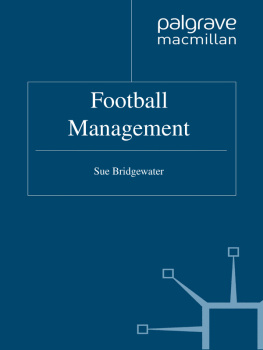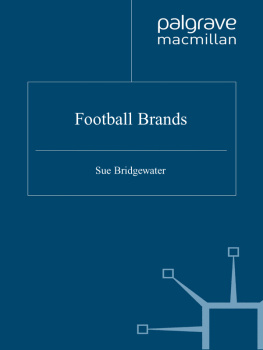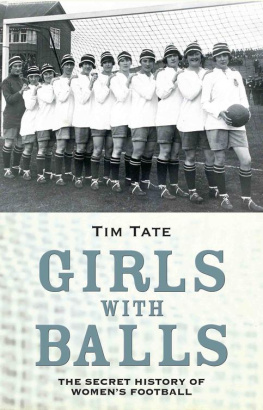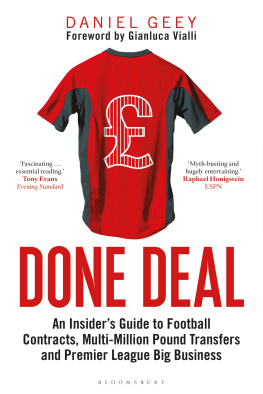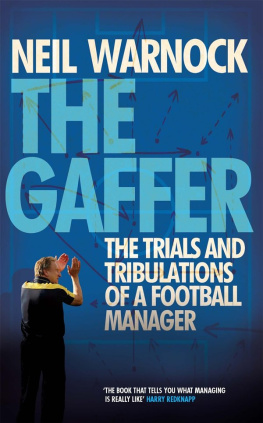Football Management
Football Management
Sue Bridgewater
Warwick Business School, University of Warwick, UK


Sue Bridgewater 2010
All rights reserved. No reproduction, copy or transmission of this publication may be made without written permission.
No portion of this publication may be reproduced, copied or transmitted save with written permission or in accordance with the provisions of the Copyright, Designs and Patents Act 1988, or under the terms of any licence permitting limited copying issued by the Copyright Licensing Agency, Saffron House, 610 Kirby Street, London EC1N 8TS.
Any person who does any unauthorized act in relation to this publication may be liable to criminal prosecution and civil claims for damages.
The author has asserted her right to be identified as the author of this work in accordance with the Copyright, Designs and Patents Act 1988.
First published 2010 by
PALGRAVE MACMILLAN
Palgrave Macmillan in the UK is an imprint of Macmillan Publishers Limited, registered in England, company number 785998, of Houndmills, Basingstoke, Hampshire RG21 6XS.
Palgrave Macmillan in the US is a division of St Martins Press LLC,
175 Fifth Avenue, New York, NY 10010.
Palgrave Macmillan is the global academic imprint of the above companies and has companies and representatives throughout the world.
Palgrave and Macmillan are registered trademarks in the United States, the United Kingdom, Europe and other countries.
ISBN 9780230238411 hardback
This book is printed on paper suitable for recycling and made from fully managed and sustained forest sources. Logging, pulping and manufacturing processes are expected to conform to the environmental regulations of the country of origin.
A catalogue record for this book is available from the British Library.
A catalog record for this book is available from the Library of Congress.
10 9 8 7 6 5 4 3 2 1
19 18 17 16 15 14 13 12 11 10
Printed and bound in Great Britain by
CPI Antony Rowe, Chippenham and Eastbourne
To my sons, James and Sam
CONTENTS
LIST OF FIGURES
LIST OF TABLES
PREFACE
The writing of this book on football management is intended to work on two levels. First the book aims to identify lessons which business managers can learn from reflecting upon the challenges of working in this turbulent, results-driven sector where football managers try to get teams of highly talented individuals to perform week in, week out. Second, this is a book about and for football and football managers. Having been privileged to work with football managers, football bodies and football clubs for almost ten years, the impact of shortening tenure, the massive rate of churn of football managers and the pressures under which they work are clear to see. It is hoped that this book might offer useful insights for managers, prospective managers and those who employ them.
At first glance, the topic of the book may appear to be narrow why football management in England? Why not focus also on football management in other countries? The reasons are two-fold. The systems in football clubs vary country by country, so that models such as Sporting Director and head coach predominate in many countries. As the challenges of this system are somewhat different and it would be so difficult to capture all of this in one book, I decided to focus on exploring football management in one context. Second, English football, particularly the Premier League, attracts a global audience. Accordingly management of these clubs involves management of multi-cultural teams of players, international media and indeed involves many international managers Roberto Mancini, Avram Grant, Roberto Di Matteo, Rafa Benitez and Paolo Sousa being just some of the managers currently managing in the English game. The book may centre on management in the English leagues, but these are of global interest.
In writing this book I have drawn on the insights which I have gained since becoming involved in football in 2001. I owe my involvement in the game to many people and, whilst it is hard to single out individuals for thanks among so many who have helped to spark my interest and enhance my understanding of football management, I could not let this opportunity pass without extending particular thanks to John Barnwell and Howard Wilkinson at the League Managers Association, for originally championing qualifications for football managers and choosing Warwick Business School to work with them on the Certificate. My thanks also to Richard Bevan, Graham Mackrell, Frank Clark, John Duncan, Olaf Dixon for their ongoing support and commitment and to everyone at the League Managers Association for being a joy to work with. Thanks also to the Professional Footballers Association, to Gordon Taylor, Pat Lally and Jim Hicks for their generous support for the Certificate in Applied Management for football managers and to everyone at the Football Association, particularly Danielle Every and John Peacock, for their help and support over the years. Many thanks to Deloitte and Touche Sport for providing me with access to their excellent reports on football finance. These are truly invaluable to anyone who wishes to understand the challenges of football management.
The analysis and discussion in this book are based on interviews with a number of football managers who kindly gave their time, as well as on research into football management which I have conducted over the years. Any errors or omissions are down to the author alone. The interviewees are intentionally not named in the text I would prefer to highlight the issues rather than the individual or club concerned but they know who they are and my thanks go to them and indeed to all the football managers and prospective football managers with whom I have had the pleasure to work. May you all reap the successes you richly deserve for the time and commitment which you have shown to preparing yourself for a challenging profession.
SUE BRIDGEWATER
Warwick Business School
INTRODUCTION
The Football Management Context
Mid January 2010 sees the familiar trend of football managers parting company with their clubs repeating itself. So far this season, twenty three managers have been dismissed and six have resigned (Mark Robins: Rotherham to Barnsley, Paul Lambert: Colchester to Wycombe, Gary Waddock: Aldershot to Wycombe, Hans Backe from Notts Co., Owen Coyle, Burnley to Bolton and Paul Hart from QPR. The predictable cull of football managers, often after brief periods in charge of their respective clubs, is sometimes greeted with sadness but often with relief and even joy by fans. Footballs sack race seems to have become as much of a spectacle as the matches the manager presides over. At a recent Ipswich Town match, the Sky summarizer commented that more cameras were focused on Roy Keanes reactions from the dugout than on the match action.
Football management is an industry so turbulent that it must surely be without parallel. Whilst CEOs, Creative Directors, Head Masters, might be judged on results, often in the short-term, maybe with high levels of public scrutiny, few face the extremes of football management. This season, John Barnes was given eleven games in charge of Tranmere Rovers, in 200708 Martin Allen went after four games in charge of Leicester City, Dave Watson after losing a pre-season friendly at Tranmere in 200203, Steve Claridge from Millwall before a game had been played of the 200506 season and Leroy Rosenior after some ten minutes as manager of Torquay, before a change of ownership took the club in a different direction.

